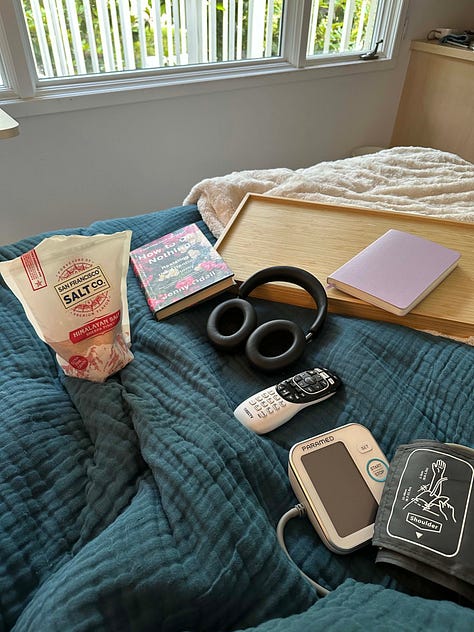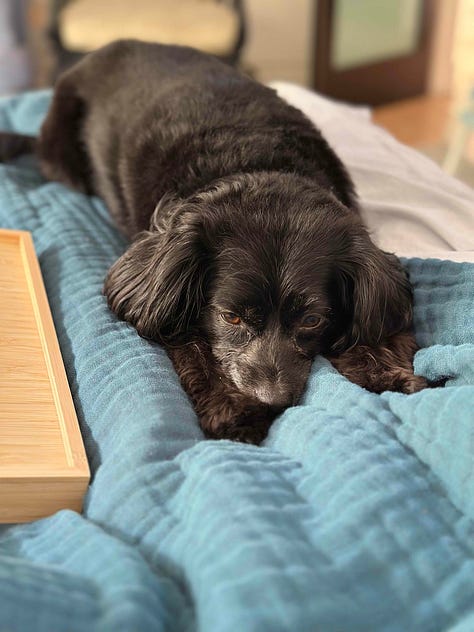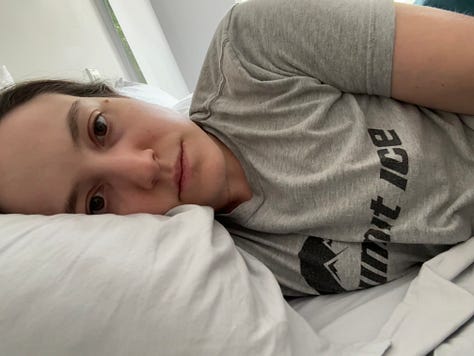In my last newsletter, I wrote about my relationship with my dog, Eloise – trying to figure out whether she had developed sympathy Long Covid or was depressed about me having Long Covid or had a separate illness/injury. (Answer: all of the above!) After being on crate rest at her trainer’s house to recover from an IVDD back injury, we reunited and things were great for a moment…until I sat down. At which point Eloise shied away from me again. I ended the last newsletter on a hopeful note, recounting that Eloise had happily jumped into bed with me at night. The promise of progress.
I haven’t written since because A) my psychiatrist suggested I try more “cognitive rest” for a week (maybe I’ll write more on how well that did not work later) and B) I was waiting to have something better to report.
“Nobody wants to hear about how my best efforts are only leading to more problems,” I told my mom yesterday. It’s such a downer, continual installments in a series that might as well be titled “Guess What Else Went Wrong?”
It’s almost funny – how my attempts to make things better keep making things worse.
Almost.
Do people want to hear about how, though Eloise’s back no longer pained her, she remained emotionally distressed by signs of my sickness (i.e. me sitting or lying down during the day), and how I proceeded to over-exert myself to demonstrate how okay I was – playtime, multiple walks, rapid escalation in my own physical activity, no time to recover from 15-hour time difference jet lag – which backfired when all of that caused me to crash…and how I then concluded that both Eloise and I needed more help, so I temporarily moved into my mom’s house, where Eloise had more space to run around and another dog to play with, and I had more support with daily activities, and I undertook a week of both physical and cognitive rest…and how instead of things getting better, they got worse.
With only milquetoast TV shows and a meditation app to occupy me, my mood plummeted. With a change in meds to address my skyrocketing standing heart rate, my blood pressure took a nosedive. And Eloise, leaping around a house and backyard full of stairs, ended up re-injuring her back and is once more on bed rest and prednisone.
My mom said she’d want to read about that. But she’s my mom. “People like following along,” she said.
Do they? Do you? I guess I hope so. I am well aware that all this is nothing compared to, say, the terror experienced by immigrants across Los Angeles. I’m not trying to compete or throw myself a pity party.
It’s not what I want to spend my time thinking - or writing - about. It’s just…what’s dominating my life right now. It’s amazing how limited my capacity for other things is when it costs so much energy to figure out if I can shower and go sit outside for ten minutes, or whether I should just choose one.
The only thing that consistently makes me feel better in the hardest moments of life is writing my way through. The only thing I have access to now, that is. If I were healthy, I’d turn to running, diving, travel, activism, socializing. But I have the energy of a slug. Or maybe less than a slug? It probably takes a lot of energy to do all that scooting around.
And when I’m muddling through the darkness, it helps me to read about other people doing the same, even if they haven’t made it out of the darkness yet.
I believe the purpose of writing – or of my writing, at least – is to disturb the comfortable and comfort the disturbed.
This may not be a super popular opinion right now – a moment when happy ending books like romances are selling much better than literary fiction, which tends to be suffused with the bleaker realities of life.
But whatever. It’s what I’ve got.
That being said…
I also believe that paying deliberate attention to good things in life leads you to notice more of it. That’s the idea behind gratitude journals, right? Not that I’ve ever successfully kept one.
The “Good” in Good Material has been ironic, up to now.
I know I’m good at teasing out the nuances of things going wrong. My “look for the good” muscles are less well-developed.
It strikes me that this newsletter could be a useful place to exercise them, as a counterweight to the gloom of installments about chronic illness or politics or ecological destruction.
Going forward, I am planning to send out periodic dispatches of good things. Things I’ve read or watched, or things happening in the world. Good being defined broadly. To kick things off….
Sincerely Good Material
Good things to read:
First: not good as in happy, but good as in hitting the bullseye of ‘comforting the disturbed’ – THE TWO KINDS OF DECAY by Sarah Manguso. A spare, lyrical book about Manguso’s experience with the rare autoimmune illness that dominated her twenties.
Some lines I highlighted:
“This is suffering’s lesson: pay attention. The important part might come in a form you do not recognize. You might not know to love it. But to pay attention is to love everything. To see the future as brightness.”
“Six months after the diagnosis, I decided that if I had enough hobbies, it wouldn’t matter if I stayed sick. She’s sick, I imagined people would say, but she has so many hobbies.”
“You can’t learn from remembering. You can’t learn from guessing. You can learn only from moving forward at the rate you are moved, as brightness, into brightness.”
More upbeat: RUN FOR THE HILLS by Kevin Wilson.
If the TV show Modern Family were a novel, it might be this. The story of four half-siblings who, having just learned of each other’s existence, set off on a cross-country road trip to find and confront the father who abandoned each of them in turn. A smart and sweet story that could be really sad in another author’s hands, but Wilson uses a light touch. A very pleasurable read.
“You set out with grand designs, expecting glory and riches, and then you ended up surrounded by people who were so much younger than you and did not give a shit about your quest and you realized, oh, god, you weren’t even halfway into your quest, and the campus police would arrest you if they heard you talking to the students and saying the word quest over and over and over, holding up a picture of a young woman.”
“Maybe the secret to pain was to acknowledge it, to admit that it hurt so bad, so you didn’t have to pretend that it didn’t. And maybe it didn’t go away. Maybe the secret to pain was to respond to it in ways that made the pain worth it. Maybe she was trying to rationalize the fact that she was taking a child, one who was clearly very fragile, to the farthest edge of the country to meet a father who might not even exist.”
Looking for a shorter read?
Check out Deb Olin Unferth’s essay “The Stipend” in the Paris Review.
On its face, it’s an essay about how Deb spent the stipend that came with her university teaching position, but it’s also about isolation, longing, Covid, desire, and fulfillment. I am personally grateful for Deb’s stipend because I have it to thank for my friendship with Deb, since it led her to the Arctic Circle Residency last summer where we both met and got Covid.
The essay opens with an account of how the the stipend and the pandemic’s onset led her to buy books - too many books.
“Sign of the times, you might say. We all have too much stuff. I had too much stuff long before the stipend. In the many years when I had almost nothing, I still had too much stuff. Anyone reading this almost certainly has too many books, too many gadgets, too many clothes. They probably buy too much stuff online, cheap crap, four different kinds of plastic wrapped in three different kinds of plastic. How else do you think we are burning this planet to the core?
Big deal. I bought some stuff.
But I’m telling you, whatever you imagine is nothing like all these books.”
Deb has written a lot of excellent fiction, but/and if you like this essay and want to read more of her nonfiction, I highly recommend her memoir REVOLUTION, which is about how she ran away from college in search of a Latin American socialist revolution to join. Which, again, I realize doesn’t sound like a barrel of laughs, but it is. It’s equal parts funny and astute.
Good things to watch:
THE REHEARSAL by Nathan Fielder (HBO MAX). This is season 2 of the show, and you don’t need to watch season 1 to ‘get it,’ but if you’re not at all familiar with Fielder, I would recommend watching a couple episodes of his TV Show NATHAN FOR YOU to get a sense of his style. In that show, he presents himself as a business consultant offering small business owners questionable ideas for revamping their businesses. Ideas like encouraging a gas station owner to sell gas for $1.75/gallon after rebate…but the rebate has to be deposited in a box at the top of a mountain that can only be reached by an overnight hike. (S1 E4: Gas Station, Caricature Artist.) I’d also recommend S3 E2, in which Nathan starts a sportswear brand called Summit Ice to promote Holocaust awareness – a storyline that ends up playing a role in The Rehearsal.
This season of THE REHEARSAL is about air safety – Nathan has obsessively read the flight logs of the moments before fatal airline crashes and has concluded that lack of communication between pilots and first officers is a major factor. He endeavors to solve this, and the lengths he goes to are….extreme. Just watch it. But also, if you do, I’d recommend committing to watching all of the episodes, because its brilliance reveals itself in progressive layers, and the final episode is the best of them all.
As a companion piece, on the subject of flight safety – John Oliver recently did a great investigation of Air Traffic Control. Watching this will not make you feel any better about flying…I’m realizing as I type that this counts as ‘good material’ only insofar as it is a smart and darkly funny investigation of an under-explored subject. Fuck it, I guess my idea of good is a little dark and twisted, okay?
If you’re really on a roll with dark and twisted plane-related content and want more, I’d suggest pairing those two watches with the novel SKY DADDY by Kate Folk, which is about a young woman who is sexually attracted to airplanes and dreams of ‘marrying’ a plane by dying in a plane crash. Yes, you read that correctly.
Good News:
I know we’re all cheering Gavin Newsom on as he stands up to Trump….but the dude has also proposed some truly terrible cuts to the California budget. For example: Newsom proposed instating a Medi-Cal asset limit that would render seniors and disabled people with more than $2,000 dollars in savings ineligible for Medi-Cal coverage. $2,000! As if that constitutes a sufficient safety net. That’s not the good news. The good news is that the California legislature pushed back, and the asset limit has been raised from $2,000 to $130,000 for a single person, $195,000 for a couple.
In global news, by the end of the UN Ocean Summit, 50 countries had signed on to a global treaty aiming to protect 30% of the world’s oceans by 2030. The UK hasn’t signed on yet, but they did agree to ban the highly destructive fishing practice of bottom-trawling. (The US? Well, we didn’t even send a delegation to the summit. But this is the ‘good news’ section.)
That’s all I’ve got for now. If you’ve read/seen/encountered any good material lately - please share in the comments!



*Yes, I’m aware that reading How to Do Nothing is different than actually doing nothing. In my defense, I haven’t actually read it yet.
**And yes, that is a Summit Ice t-shirt, for Nathan Fielder stans (shout out to my friend Allegra, who gifted it to me circa 2015).





Yes unbelievably it took me only about a month to recover from that, omg! You WILL get better. In the meantime you are still your hilarious, vibrant, wise, loving self. It radiates from you no matter what. 💖
Your writing is as sharp and penetrating as always. Just sad that you are still struggling with such awful health issues. But I believe there are so many people in parallel situations who benefit from your insight and that has to bring some hope. Thank you and keep writing and fighting. Eloise too.